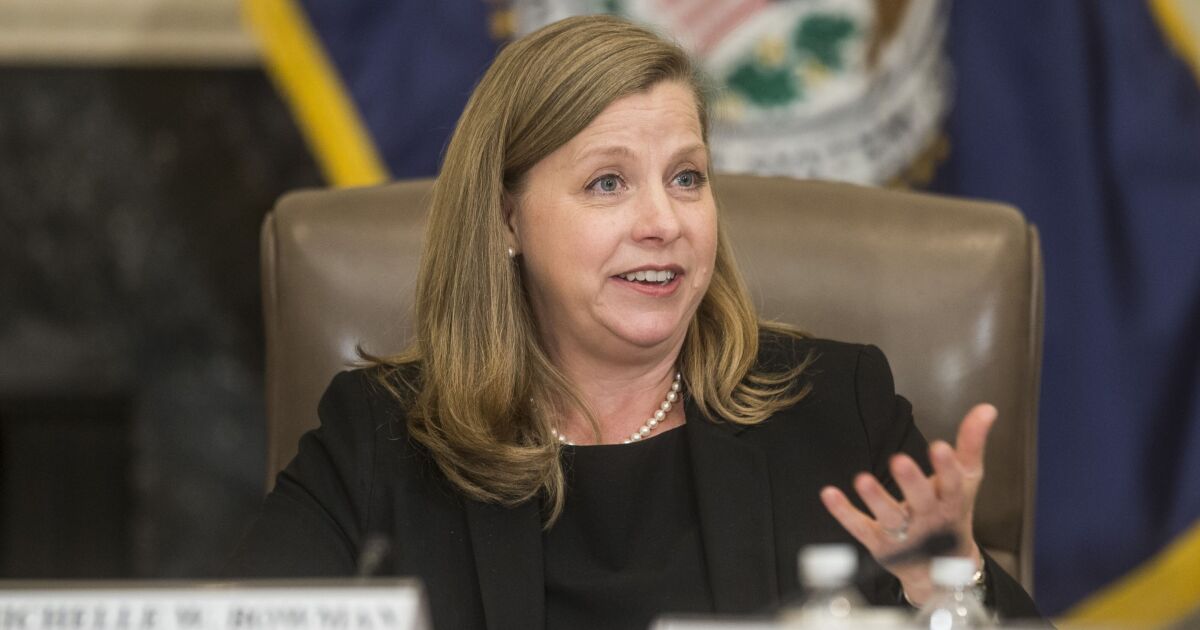
Federal Reserve Governor Michelle Bowman said interest rates may need to rise further and stay higher for longer than previously expected to get inflation down to the central bank's goal.
Despite recent improvements, "inflation remains well above the FOMC's 2% target. Domestic spending has continued at a strong pace, and the labor market remains tight," Bowman said Wednesday in remarks prepared for an event in Marrakech, Morocco, on the sidelines of the World Bank/International Monetary Fund annual meetings. "This suggests that the policy rate may need to rise further and stay restrictive for some time to return inflation to the FOMC's goal." Bowman explained she was reading a shortened version of her speech because of time constraints.
The current Treasury yield curve is leading homeowners to pay mortgage rates at least 120 basis points more than they should, equal to an extra $245 a month on a $300,000 loan, their letter said.
Bowman's remarks sounded somewhat less hawkish than her comments on Oct. 2, when she said multiple rate hikes would likely be needed to contain price pressures.
She didn't comment on her expectations for the Federal Open Market Committee's next rate decision on Nov. 1.
U.S. central bankers left their benchmark lending rate unchanged last month in a range of 5.25% to 5.5% — a 22-year high — and signaled they expect one more increase this year. The Fed will release the minutes of the Sept. 19-20 gathering at 2 p.m. in Washington.
Several Fed officials have said in recent days that a surge in long-term Treasury yields may lessen the need for further rate hikes. Investors see a less than 20% chance of another quarter-point increase when policymakers next meet, according to pricing in futures markets.
Bowman, in answer to a question about the implications of the recent rise in bond yields, said this was just one factor the central bank is monitoring, while indicating that it could be a reason for caution.
"Financial market conditions have certainly tightened," she said. "That allows us a little bit of patience; that we can continue to watch as economic conditions and financial conditions continue to evolve."
"We still are a long way from 2% for inflation and it's important that we identify a path, or are continuing on a path, that will allow us top reach 2% inflation in a sustainable and timely way," Bowman added.
Financial Stability
Bowman, in her speech, warned that a rising rate environment may erode the credit quality of banks' balance sheets if the economy weakens.
"It is important to monitor these evolving risks, and if necessary, take action to minimize the possible spillover effects on the wider banking and financial system," she said in her remarks, which focused on financial stability risks.
She said changes to the bank regulatory framework could have unintended consequences and pose broader risks to the financial system, and said policymakers should carefully consider whether higher capital requirements currently under consideration are "efficient and appropriately targeted."
Bowman said she is monitoring risks in the commercial real estate and non-bank sectors. She also urged U.S. officials to consider steps that would shore up resilience in the Treasury market, including reconsidering the leverage ratio and capital surcharge that the largest global banks face in the U.S.



